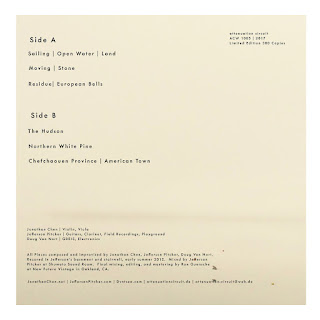Interview with Shane Parish
Shane Parish who is based in Athens, Georgia, has been active guitar player, arranger, and transcriber working both solo and with other musicians such as Bill Orcutt ( Bill Orcutt Guitar Quartet), Ahleuchatistas. He has released with such labels as Tzadik, Palilalia, Cuneiform, International Anthem.
His catalogue embraces and encompasses different genres and musical worlds of folk, sea shanties, improvised music, jazz.
We asked Shane a few questions…
1. Beginnings and inspirations are always such a groundbreaking point for many artists to actually start with their body of work and the craft itself. What was such a thing for you and how was your early adventure with composing.
A lot of the kids that I grew up around started playing guitar. I was 14 years old when I acquired one myself. At first, I started learning riffs from my friends and then I learned a few chords. My early adventures in composing involved just moving my fingers around into different shapes and finding things that I thought sounded Interesting and then stringing them together. I guess that’s what songwriting is. I had a friend who would write lyrics and sing. So my first few years of playing involved writing all the music to accompany his words. I also would make up these little short, fake classical guitar pieces. Before I knew anything about classical guitar or music theory or anything like that.
2. You use guitar but also different media – how is your approach to the instrument – whatever it may be.
Many approaches. I very much enjoy practicing. And I enjoy studying various repertoire for research and development. Because my first beginnings came out of experimentation and developing my own voice, my practice of absorbing various styles and techniques serves to provide me with more creative tools and freedom to create within my own vibrations.
3. Could you describe creative process of your work little bit?
It just depends. For many years I enjoyed playing guitar by setting a few parameters and then allowing my stream of consciousness to take over, as in a dream state. And I still think that some of my most inspired work comes from this process. In recent years, I’ve become more and more interested in having very clear ideas about what I want to execute. So, I don’t turn off. I stay alert. I consider many possible voicing and harmonization. Maybe I have always straddled this dialectic between control and abandon.
4. How inspiring has been the work of others to you, not only in terms of being a listener but also when it comes to ideas and concepts that you have found useful?
I am endlessly inspired by the works of others. I try to understand what it is I find moving about particular pieces of music or recordings. I am not looking to copy directly, but rather to acquire tools for my own expression.
5. How is it different to work and play live with others and to work on your own?
I love the action and reaction that happens when working with others. It brings out many surprises in my own playing. When you’re by yourself, it’s kind of a tight rope act. Especially if you’re playing composed material. I find it easy to show up and improvise, but I’m not only interested in improvising. I’m interested in the highly crafted musical object. So it’s a balancing act.
6. How important is for your musical and art activity, the ever changing form of the musical distribution – what are its hurdles?
This is an area that I don’t orient to so much. I’m too focused on playing guitar, teaching, and thinking about music. I start to feel blue if I become bogged down by bureaucracy.
7. Plans for the future?
I plan to keep growing and going. Every time I open a door, I see 10 more doors.
Photo by Courtney Chappell


Comments
Post a Comment